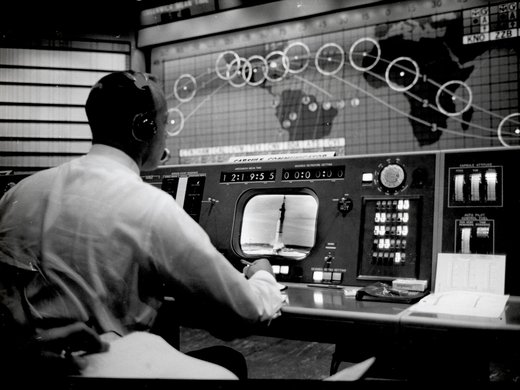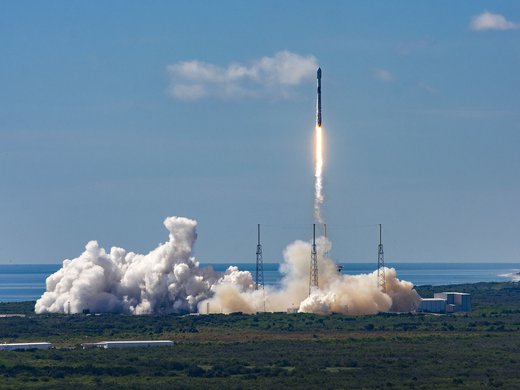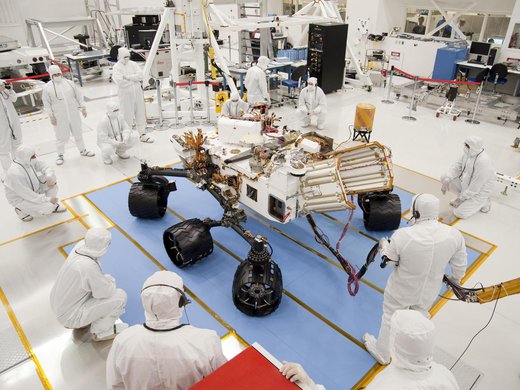In the pre-dawn hours of December 6, 2020, a cylindrical capsule, roughly the size and shape of a rice cooker, descended from the sky and touched down on the Royal Australian Air Force’s Woomera Test Range in South Australia. Inside the capsule were 5.4 grams of samples mined from the subsurface of the near-Earth asteroid Ryugu by the Japanese Hayabusa2 spacecraft. Hours earlier, Hayabusa2 had released the capsule during a flyby of the Earth before heading off on another 10-year mission. Scientists who helped analyze the samples characterized them as “among the most primordial material available in our labs to date, forming a unique collection for studying the origin and evolution of our Solar System.”
The mission was a step forward for science and our understanding of the universe. It was also a clear demonstration of spacefaring organizations’ technical capacity to land on asteroids, mine them, and return samples to Earth. This excites many in the private sector, who expect billions of dollars will be made in space mining. According to one estimate, mining resources from just the 10 most cost-effective near-Earth asteroids could generate profits of US$1.5 trillion.
The incentives for claiming ownership in space are strong, but are there good reasons to permit ownership of resources and locations in space? On what grounds, if any, can a country or organization claim ownership to a spot or a resource in space?
Why Ownership Matters, for Better or Worse
How we settle questions of property in space affects the nature and extent of exploration, science and commerce — as well as wealth distribution here on Earth. The space property regime we adopt determines the incentive structure facing states and private companies interested in exploiting space resources, exploring other celestial bodies, and placing satellites in Earth’s orbit.
Ownership is beneficial, from one point of view, because it encourages people and organizations to “make the most productive use” of land and resources. The idea, which emerges in different ways in the Enlightenment philosopher John Locke’s theory of property, is that ownership ensures that one can enjoy the benefits of one’s efforts, rather than have them arbitrarily appropriated by another. Ownership provides the certainty needed to make more productive, long-term use of land and resources. That space tourism, mining, communications systems and other activities are, or have the potential to be, profitable, also means there are more resources available for space exploration and science.
But ownership can have negative consequences as well. Although ownership may create incentives for productive use, it may also, in some cases, generate less productive use. If, say, an explorer were to secure sole rights to mine an asteroid or develop a network of satellites, the public’s access to the ensuing benefits could conceivably be slowed, because the urgency for the explorer to act before others do is removed. Moreover, whether ownership incentivizes productivity or not, it clearly risks exacerbating inequality on Earth. Those with the opportunity to claim ownership of space resources or locations are those who already hold massive wealth — namely, a handful of advanced economies and private sector companies. Under present circumstances, allowing ownership of space may simply enable the rich to get richer.
Control, Use and Benefit Rights in International Space Treaties
“Ownership” may be too broad a term to properly characterize the economic and moral stakes we face. It’s certainly too general to parse exactly what is permitted or prohibited in existing international space treaties. Consider the three kinds of ownership rights proposed by the contemporary political philosopher Joshua Cohen in lectures at MIT in the early 2000s:
- Control rights are those that allow one to own property in the sense of having moral or legal grounds to exclude others from taking or using it, without one’s consent. This is ownership in the ordinary sense of the term.
- Use rights allow one to use something — such as a park or a river, or a moon or low-Earth orbit locations — without necessarily owning it.
- Benefit rights are entitlements to the gains or goods that might be generated from one’s efforts (such as income for working) or one’s holdings (such as revenue from oil on one’s land).
While existing space treaties are often criticized for offering aspirational ideals, limited practical guidance and much ambiguity about space ownership, reading them in light of these three ownership rights offers some insights.
The 1967 Outer Space Treaty, for example, asserts that “exploration and use of outer space should be carried on for the benefit of all peoples.” Signed by all major spacefaring nations, article II holds that “outer space, including the moon and other celestial bodies, is not subject to national appropriation.” In effect, this rules out control rights. Under its conventions, spacefaring nations are forbidden from claiming or excluding others from locations and resources in space. However, the treaty does allow states to operate in space, which leaves open the possibility that they may extract resources and occupy (without owning) properties in space. Admittedly ambiguous, the treaty seems consistent with a use rights approach to space and its resources.
Slightly less ambiguous guidance can be found in the Moon Agreement. Adopted by the United Nations General Assembly in 1979, this treaty articulates a vision of the Moon and “other celestial bodies” as “the province of all mankind.” Like the Outer Space Treaty, it prohibits ownership in the sense of control rights. Unlike the Outer Space Treaty, however, the Moon Agreement addresses benefit rights, offering a fairly egalitarian principle of distribution of the benefits derived from space resources, with a Lockean twist. The agreement holds that there should be an “equitable” sharing of any benefits derived from resource extraction with “special consideration” given to the needs and interests of “developing countries.” But it also calls for “special consideration” in the distribution of benefits to those countries “which have contributed either directly or indirectly to the exploration of the moon.” It thereby recognizes the principle that those who invest and take risks to extract resources ought to be rewarded for their efforts.
Constructive as the Moon Agreement may be in articulating a more egalitarian framework for benefits distribution, while acknowledging the need to reward investment and effort, it has one major flaw: Three of the world’s leading spacefaring nations — the United States, Russia and China — have not signed it. One observer suggests that “the U.S. in particular does not view space as a national park that must be left untouched, but rather like the Wild West with much to offer in the ways of riches for those willing to risk the journey.” The history of reckless and widespread injustice that characterized European and American colonial activities is not one we should risk repeating.
Yet, in 2015, President Barack Obama signed the US Commercial Space Launch Competitiveness Act, which gives private corporations a right to all non-living resources they extract from asteroids, moons and other planets — although not ownership of those bodies themselves. Similar laws have been passed in Japan, Luxembourg and the United Arab Emirates, raising concerns that questions of space ownership will be settled through “first-mover advantage.” In other words, those who reach the stars first may own whatever they can extract from them.
A More Just Distribution of Space
The fact remains that although current circumstances suggest ownership of space and its resources will be determined by “first-mover advantage,” with resources claimed by those who grab them first, this approach is not consistent with the aspirational ideals articulated in earlier treaties. Space exploration is usually, and ideally, defended as an opportunity to expand our understanding of the universe and ourselves, and to benefit all of humanity. These ideals convinced many to accept, if not enthusiastically embrace, the public costs and risks of space exploration. Yet, we routinely fail to live up to them.
Allowing public and private sector organizations to have use rights, and perhaps even control rights, certainly generates benefits for some. With its placement of 12,000 communications satellites in low-Earth orbit, for example, SpaceX’s Starlink has brought internet access to remote communities — and, for that matter, to Ukraine, as it defends itself from Russian attack. By permitting near-Earth space mining, we set the stage for more distant exploration (because spacecraft can gather needed resources en route rather than lift them from Earth), and open the possibility of finding minerals that can benefit industry at home. But the lion’s share of benefits will still accrue to those companies and nations with the means to participate, leaving less-equipped societies further and further behind.
What can we collectively do to ensure that all societies have sufficient opportunities and resources to share in the benefits of outer space? Are we capable of designing an outer space ownership regime that is more than a finders-keepers race to control the commons? The good news is that we are capable. Muddy though the provisions of the Moon Agreement may be, they offer a precedent for more egalitarian distribution of the benefits of spacefaring. The bad news is that activating more egalitarian ideals in space will require making significant changes in domestic and international law for the world’s leading spacefaring nations. In the current geopolitical context, that may be an aspirational journey too far.
That said, it’s not inconceivable that by the time Japan’s Hayabusa2 returns to Earth in 2030, the world will have achieved more clarity and justice on the issue of who owns outer space. At issue is whether spacefaring nations and companies can discuss, let alone agree on, ownership rules consistent with the Moon Agreement’s aspirational ideals. It is a moral moonshot many will regard as impossible. But as a later critic of Locke, Jean-Jacques Rousseau, asserted, “The bounds of possibility, in moral matters, are less narrow than we think.” Our weaknesses, vices, prejudices and self-interests may shrink our moral vision, but we are capable of looking up and imagining a better future for all.





